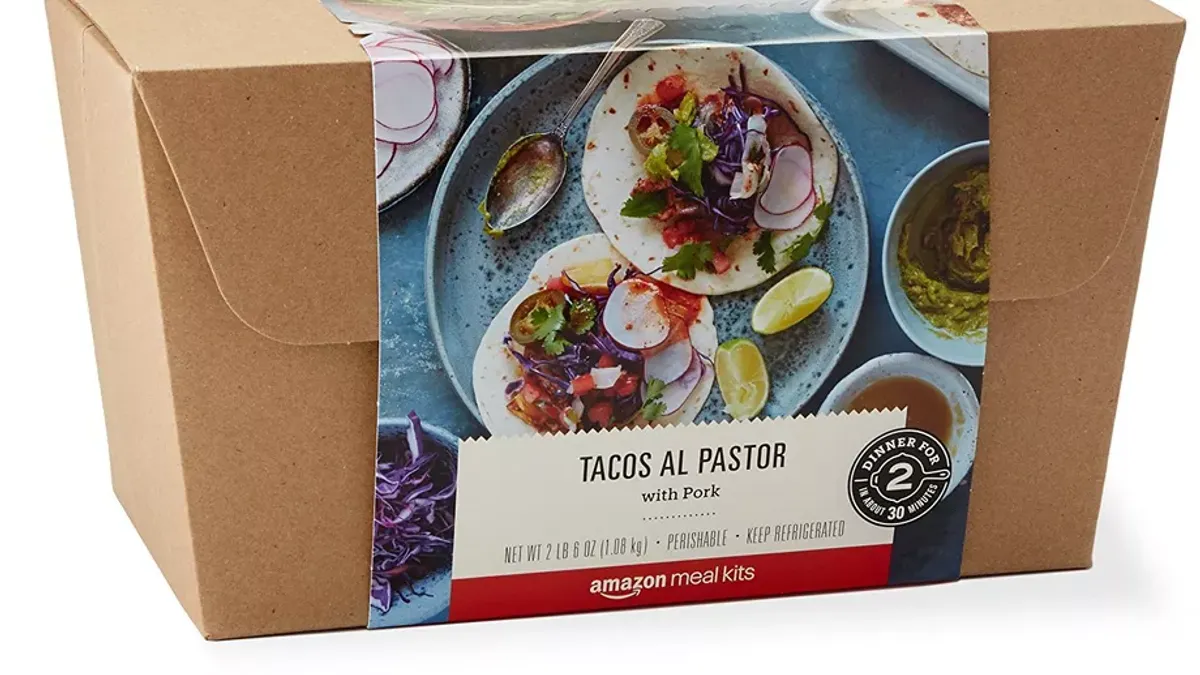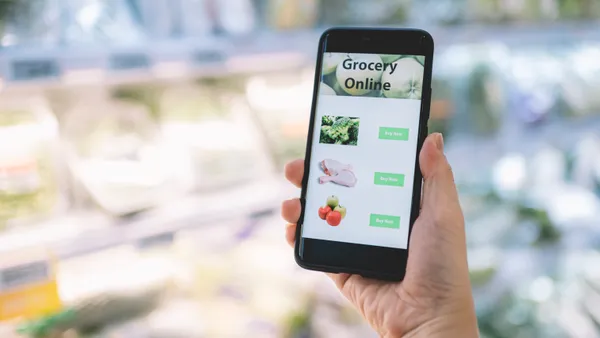Dive Brief:
- Amazon Meal Kits are now available at select Whole Foods locations in the San Francisco Bay Area, Southern California, Nevada and Arizona, an Amazon spokesperson told Grocery Dive.
-
In addition to Whole Foods, Amazon Meal Kits are currently available to AmazonFresh and Prime Now customers in Seattle, Chicago, the San Francisco Bay Area, Southern California and the Northeast. The kits are also sold at Amazon Go stores.
-
The meal kits are portioned for two and can be prepared in about 30 minutes. There are eight different meal options priced from $15.99 to $19.99. Selections include chicken-fried chicken with farmhouse potato salad and red cabbage slaw; vegetarian fajita bowls with corn, pico de gallo and queso fresco; and seared salmon with fennel and pea risotto.
Dive Insight:
In placing Amazon Meal Kits inside Whole Foods grocery stores, Amazon is doing more than just stepping into a growing category. It's also seizing an opportunity to strengthen its in-store visibility and build its brand affiliation as a grocery provider.
Amazon launched its private label meal kits for select AmazonFresh customers in 2017, but this is the first time they have appeared in Whole Foods Market locations.
"We are excited to offer Amazon Meal Kits at select Whole Foods Market stores in the Bay Area, Southern California, Nevada and Arizona," an Amazon spokesperson wrote in an email to Grocery Dive. "We think Whole Foods Market customers will love the quality, convenience, value and variety our Meal Kits offer and look forward to their feedback."
Moving Amazon Meal Kits into Whole Foods is a natural step, given Amazon’s growing private label selections and the brick-and-mortar reach it has through Whole Foods. It also fills a void: Although Whole Foods has offered meal kits through companies like Purple Carrot, the grocer does not have its own offering in the rapidly growing category. Competing retailers including Kroger and Albertsons offer their own in-store meal kits, while brands like Blue Apron are targeting shelf sales as a growth outlet. According to Nielsen, in-store meal kit sales hit $93 million last year.
Furthermore, the move shows Amazon's willingness to tie its brand to Whole Foods. The e-commerce giant offers devices like e-readers and Echo smart speakers and sells Prime memberships in select stores. Amazon also sells Whole Foods' 365 Everyday Value brand products on its site.
The Wall Street Journal recently revealed Amazon’s ambitions to open a grocery chain independent of Whole Foods. If stocking its parent company's meal kits is any indication, Whole Foods is still going to play a pivotal role in Amazon’s grocery future.
Neil Saunders, managing director for retail at GlobalData, first spotted Amazon Meal Kits at his local Whole Foods store in Scottsdale, Arizona.
"I suspect this is something Amazon has been working on for some time, largely in response to increasing demand for meal kits," Saunders told Grocery Dive in an email. "It is interesting in a number of respects. First, because it underlines the fact that Amazon is increasingly willing to use Whole Foods to showcase its own brands. Secondly, because it shows Amazon is getting far more serious about developing a full line grocery proposition."
Saunders said that the products are reasonably priced and appear to be good quality. He also noted that the meal kits link with Alexa-enabled devices to provide recipes and cooking instructions — a differentiating quality aimed at making the process convenient for consumers.
Justin Smith, founder of TJI Research, predicts this is a test run for Amazon and Whole Foods before a wider rollout, which is often the case for Amazon grocery and logistics initiatives, he said. "Generally speaking, I believe Amazon is going to be investing heavily in private label meal kits," Smith told Grocery Dive in an email.
Meal kits build on top of two major competitive advantages Amazon has been investing in heavily, Smith said, including its Prime Now network of last-mile delivery solutions and its growing network of Amazon Go and Whole Foods stores, both of which can serve as retail venues and mini distribution centers for pickup and delivery.
There's evidence Amazon is looking at developing even more meal solutions, Smith noted. Back in January the company posted — then quickly took down — a job listing for a team leader to oversee a new fresh meal delivery business.













